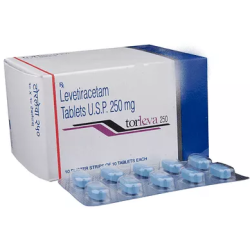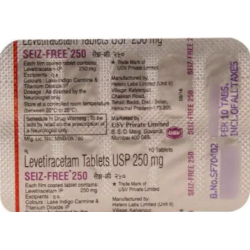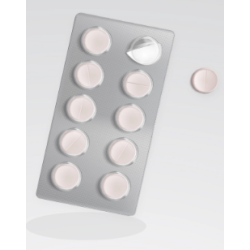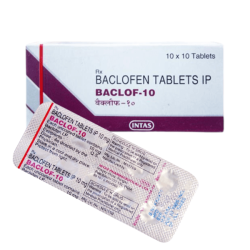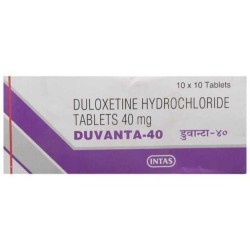Levera 250 Tablet
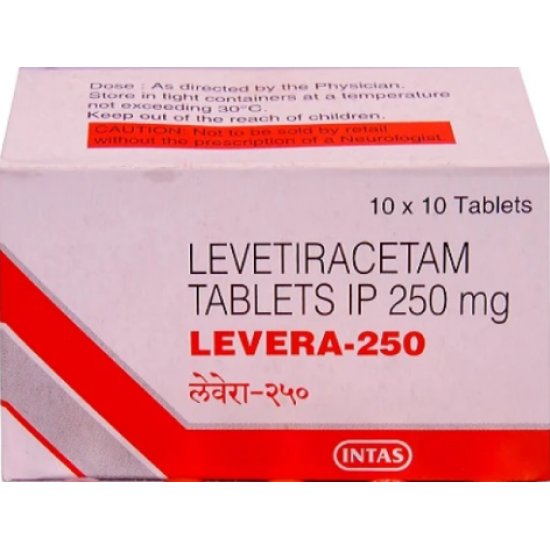
Levera 250 Tablet
$0.00
- Stock: In Stock
- Brand: Intas Pharmaceuticals Ltd
- Model: Levera 250 Tablet
- SKU: LVR250
- Active Ingredient: Levetiraceta
- Treatment: Epilepsy
- Alcohol: Don't Drink
Available Options
Levera 250mg is a brand name for the medication called levetiracetam, which belongs to a class of drugs called anticonvulsants. It is primarily used to control seizures in people with epilepsy. Seizures in people with epilepsy can manifest in various forms and intensities. Epilepsy is a neurological disorder characterized by recurrent seizures.
Here's more detail about seizures in individuals with epilepsy. Seizures can significantly impact an individual's life, affecting their safety, ability to drive or work, and their emotional well-being. Managing seizures effectively is crucial for improving the quality of life for those with epilepsy.
What is the Meaning of Seizures in Epilepsy?
Seizures in epilepsy can manifest in various forms, and the type of seizure can vary from person to person. Here are some common types of seizures associated with epilepsy.
Types of Seizures in Epilepsy
Focal Seizures (Partial Seizures):
1.) Simple Focal Seizures:
Originating in a specific area of the brain, these seizures don't affect consciousness but may cause localized symptoms like twitching or altered sensations in a specific part of the body.
2.) Complex Focal Seizures:
Beginning in a specific brain region, these seizures can alter consciousness. Individuals might exhibit unusual behaviours or movements and might not be fully aware of their surroundings.
Generalized Seizures:
1.) Tonic-clonic seizures (Grand Mal Seizures):
Characterized by two phases: Tonic Phase (Loss of consciousness, body stiffening, and rigidity.) And Clonic Phase (Rhythmic jerking movements of the limbs.)
2.) Absence Seizures:
Typically seen in children, these cause brief lapses in consciousness, appearing as staring spells without convulsions.
3.) Myoclonic Seizures:
Sudden, brief jerks or twitches of the arms and legs.
4.) Atonic Seizures:
Result in a sudden loss of muscle tone, leading to falls or loss of posture.
What are the Triggers and Warning Signs of Seizures?
Triggers:
Certain factors like stress, sleep deprivation, flashing lights, or hormonal changes can trigger seizures in susceptible individuals.
Aura or Warning Signs:
Some people experience warning signs or auras before a seizure, such as visual disturbances, odd smells, or unusual sensations.
What are the Triggers for Seizures in Epilepsy?
Seizures in epilepsy can be triggered by various factors, although triggers vary among individuals. Identifying triggers is crucial for managing epilepsy and reducing the likelihood of seizures. Here are common triggers:
- Stress:
Emotional or physical stress can lower the seizure threshold, making individuals more susceptible to seizures. Managing stress through relaxation techniques or therapy may help minimize this trigger.
- Missed Medications:
Inconsistent use or abrupt discontinuation of antiepileptic medications can disrupt seizure control. Adhering to the prescribed medication regimen is crucial.
- Lack of Sleep:
Irregular sleep patterns sleep deprivation, or fatigue can increase the likelihood of seizures. Establishing and maintaining a regular sleep schedule is important.
- Hormonal Changes:
Hormonal fluctuations, such as those occurring during menstruation, pregnancy, or menopause, can affect seizure frequency in some individuals.
- Some Other Factors:
Some people have unique triggers, which can include specific foods, environmental changes, or medications.
Identifying individual triggers can be complex and may involve keeping a seizure diary to track events and potential triggers. By recognizing triggers and taking preventive measures, individuals with epilepsy can better manage their condition and reduce the frequency of seizures.
Management and Treatment
Managing epilepsy involves a multifaceted approach that aims to reduce seizures, improve quality of life, and address associated challenges. Here are some key aspects of management and treatment for this disease:
Medication:
Antiepileptic Drugs (AEDs):
The primary treatment for epilepsy involves AEDs. Finding the right medication, dosage, and regimen tailored to an individual's specific seizure type and response is crucial.
Adherence:
Consistent use of prescribed medications is essential for seizure control. Missing doses can increase the risk of breakthrough seizures.
Lifestyle Modifications:
- Sleep and Stress Management:
Maintaining regular sleep patterns and managing stress levels can help reduce seizure triggers.
- Avoiding Triggers:
Identifying and avoiding personal seizure triggers, such as specific activities or stimuli, is important.
- Healthy Habits:
Maintaining a balanced diet, exercising regularly, and avoiding excessive alcohol or recreational drugs can contribute to overall well-being.
What conditions does Levera 250mg treat?
Certainly, Levera 250mg tablet, containing Levetiracetam, is primarily used to treat seizures associated with epilepsy. Levera 250 is prescribed to manage various types of seizures including focal seizures, tonic-clonic seizures, and myoclonic seizures in individuals with epilepsy.
How does Levera 250mg work?
Levetiracetam (Levera), the active ingredient, modulates brain activity by binding to specific receptors. It regulates abnormal electrical activity in the brain, reducing the likelihood and severity of seizures.
What is the best Dosage of it?
The starting dose for adults typically ranges from 500mg to 1000mg daily, divided into two doses. The dosage might be adjusted gradually based on individual response and tolerability.
What are the side effects of Levera Tablet?
Common Side Effects:
- Dizziness,
- Drowsiness,
- Fatigue,
- Irritability, or
- Behavioral changes might occur. These effects tend to diminish as the body adjusts to the medication.
Less Common Side Effects:
Some individuals might experience-
- Mood swings,
- Coordination difficulties, or
- Gastrointestinal disturbances.
Important Warnings and Precautions:
- Allergic Reactions:
Severe allergic reactions like rash, itching, swelling, or difficulty breathing might occur. Seek immediate medical attention if any such symptoms arise.
- Kidney Function:
Individuals with impaired kidney function may require dosage adjustments. Regular monitoring is crucial.
- Pregnancy and Breastfeeding:
The use of Levera Tablet during pregnancy or breastfeeding should be discussed with a doctor due to potential risks to the foetus or infant.
FAQs
1.) How does Levera 250mg help manage seizures in epilepsy?
Ans:- Levera 250mg contains Levetiracetam, which regulates abnormal brain activity, reducing the frequency and severity of seizures in individuals with epilepsy.
2.) Can Levera tablet be used to treat anxiety or depression?
Ans:- Levera 250mg is primarily prescribed for managing seizures associated with epilepsy and is not typically used as a treatment for anxiety or depression. However, some individuals might experience mood changes as a side effect.
3.) Is Levera 250mg effective against all types of seizures?
Ans:- Levera 250mg is used to manage various types of seizures associated with epilepsy, including focal seizures, tonic-clonic seizures, and myoclonic seizures, among others.
4.) Can Levera be used alongside other medications for epilepsy or anxiety?
Ans:- It's important to consult a healthcare provider before combining medications. Levera 250mg might interact with other drugs, so discussing potential combinations is crucial.
5.) Does Levera 250mg have an impact on mood disorders like depression?
Ans:- While Levera 250mg is primarily indicated for seizure management, some individuals might experience mood-related side effects. Consulting a healthcare professional is advised.
6.) What is the recommended dosage of Levera Tab for seizure control?
Ans:- The starting dosage for adults is typically 500mg to 1000mg daily, divided into two doses. Dosage adjustments are made based on individual response and tolerability.
7.) Can Levera 250mg cause worsening anxiety or depression symptoms?
Ans:- While mood changes are potential side effects, worsening of anxiety or depression symptoms can occur in rare cases. It's essential to report any concerning changes to a healthcare provider.
8.) Are there any special considerations for using Levera in individuals with anxiety or depression alongside epilepsy?
Ans:- Individuals with anxiety or depression alongside epilepsy might need close monitoring for mood changes or interactions between medications. Seeking guidance from healthcare professionals is crucial.
9.) Does Levera 250mg require regular monitoring while being used for seizures or epilepsy management?
Ans:- Regular check-ups and monitoring are essential to evaluate the medication's effectiveness, manage potential side effects, and make any necessary dosage adjustments for optimal seizure control.


